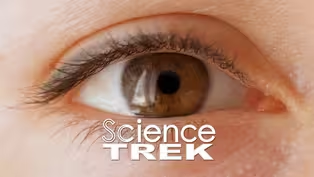
Five Senses: No Sense
Clip: Special | 1m 4sVideo has Closed Captions
How do some animals survive in their world when they don't have all five senses.
Some animals have lost some parts of their five senses. Why? How do they survive with this loss? Learn how whales, dolphins, rhinos, and sloths live.
Problems playing video? | Closed Captioning Feedback
Problems playing video? | Closed Captioning Feedback
Science Trek is a local public television program presented by IdahoPTV
Major Funding by the Laura Moore Cunningham Foundation and the Idaho National Laboratory. Additional Funding by the Friends of Idaho Public Television and the Corporation for Public Broadcasting.

Five Senses: No Sense
Clip: Special | 1m 4sVideo has Closed Captions
Some animals have lost some parts of their five senses. Why? How do they survive with this loss? Learn how whales, dolphins, rhinos, and sloths live.
Problems playing video? | Closed Captioning Feedback
How to Watch Science Trek
Science Trek is available to stream on pbs.org and the free PBS App, available on iPhone, Apple TV, Android TV, Android smartphones, Amazon Fire TV, Amazon Fire Tablet, Roku, Samsung Smart TV, and Vizio.
Buy Now

Science Trek
Science Trek is a place where parents, kids, and educators can watch short, educational videos on a variety of science topics. Every Monday Science Trek releases a new video that introduces children to math, science, technology, engineering, and math (STEM) career potentials in a fun, informative way.[MUSIC] JOAN CARTAN-HANSEN, Host: Not all creature share human's five senses.
Whales and dolphins have lost most of their sense of taste.
Scientists think they can only taste salt.
But, considering where they live, that's probably good enough.
Dolphins also have one of the worst sense of smell.
They lack the nerves that send smell information to the brain.
Rhinoceroses have a poor sense of sight.
They can't tell the difference between a human and a tree from 15 feet away.
Sloths have a decent sense of touch but don't ever pick one up.
They are solitary animals and don't like to be touched.
Touch a sloth and you may feel its razor-sharp teeth or claws instead.
Praying mantis were once thought to be deaf.
But scientists have since found a one-millimeter-long slit in its chest that acts as its ear.
The ear is apparently designed for one thing: to pick up the ultrasonic sounds that come from a bat.
It's how a praying mantis avoids becoming a bat's dinner.
For more information about the five senses, check out the Science Trek website.
You'll find it at science trek dot org
Five Senses: Most Important Sense
Video has Closed Captions
Clip: Special | 1m 4s | How do your five senses change with age? (1m 4s)
Providing Support for PBS.org
Learn Moreabout PBS online sponsorship
- Science and Nature

Explore scientific discoveries on television's most acclaimed science documentary series.

- Science and Nature

Capturing the splendor of the natural world, from the African plains to the Antarctic ice.












Support for PBS provided by:
Science Trek is a local public television program presented by IdahoPTV
Major Funding by the Laura Moore Cunningham Foundation and the Idaho National Laboratory. Additional Funding by the Friends of Idaho Public Television and the Corporation for Public Broadcasting.
